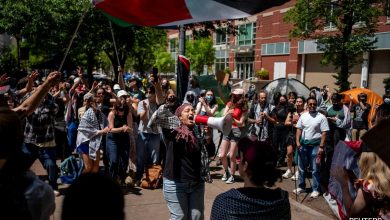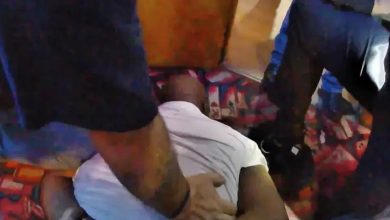Obama and Raul Castro shook hands at Mandela memorial
Johannesburg: US President Barack Obama shook hands with Cuba’s Raul Castro at a memorial for Nelson Mandela on Tuesday, a rare gesture between the leaders of two ideological opponents.
Mandela’s death at the age of 95 has diverted attention from a slew of corruption scandals in Zuma’s administration, while underscoring the gulf between South Africa’s first black president, a giant of the 20th century, and its fourth.
“Mandela had a vision. Mandela lived that vision,” said Funeka Gingcara-Sithole, 31, who was in the crowd. “But what Zuma speaks, he doesn’t live. He should do the honourable thing and resign.”
“Nothing was planned in terms of the president’s role other than his remarks,” Deputy National Security Adviser Ben Rhodes told reporters. “He really didn’t do more than exchange greetings with those leaders on his way to speak, it wasn’t a substantive discussion,” he added.
The only previous known handshake between US and Cuban Presidents since the island’s 1959 revolution was at the United Nations in 2000, when Raul’s brother Fidel shook the hand of then-US president Bill Clinton in a chance encounter.
Tough words
Obama’s gesture did not prevent him delivering tough words to leaders who, he said, invoked Mandela’s struggle against oppression while quashing opposition and dissent at home.
“There are too many of us who happily embrace Madiba’s legacy of racial reconciliation, but passionately resist even modest reforms that would challenge chronic poverty and growing inequality,” he said, speaking yards away from Castro and Chinese Vice-President Li Yuanchao.
“There are too many leaders who claim solidarity with Madiba’s struggle for freedom but do not tolerate dissent from their own people,” he added, using Mandela’s clan name.
In Cuba, state-run television broadcast the Obama-Castro handshake without commentary, along with Castro’s speech.
Some Cubans said they hoped the gesture could help to foster better ties. “I never imagined such a thing could happen,” said Yesniel Soto, 25, on her way to a government job in Havana. “I see it as something that has begun to change, a change we are all hoping for,” she said.
Such hopes have been fuelled by several recent instances when cooperation has replaced hostile rhetoric.
Obama questioned last month in Miami whether an embargo put in place in the 1960s remained an effective way of tackling the United States’ differences with Cuba.
But Rhodes noted that, while Washington has eased bans on family travel and remittances to Cuba, and taken other steps to allow greater contacts, points of friction remain.
“We continue to have the same grave concerns about both the human rights situation in Cuba and Alan Gross,” he said.
Gross is a US government contractor jailed in Cuba for committing what a judge called a crime against the state.





